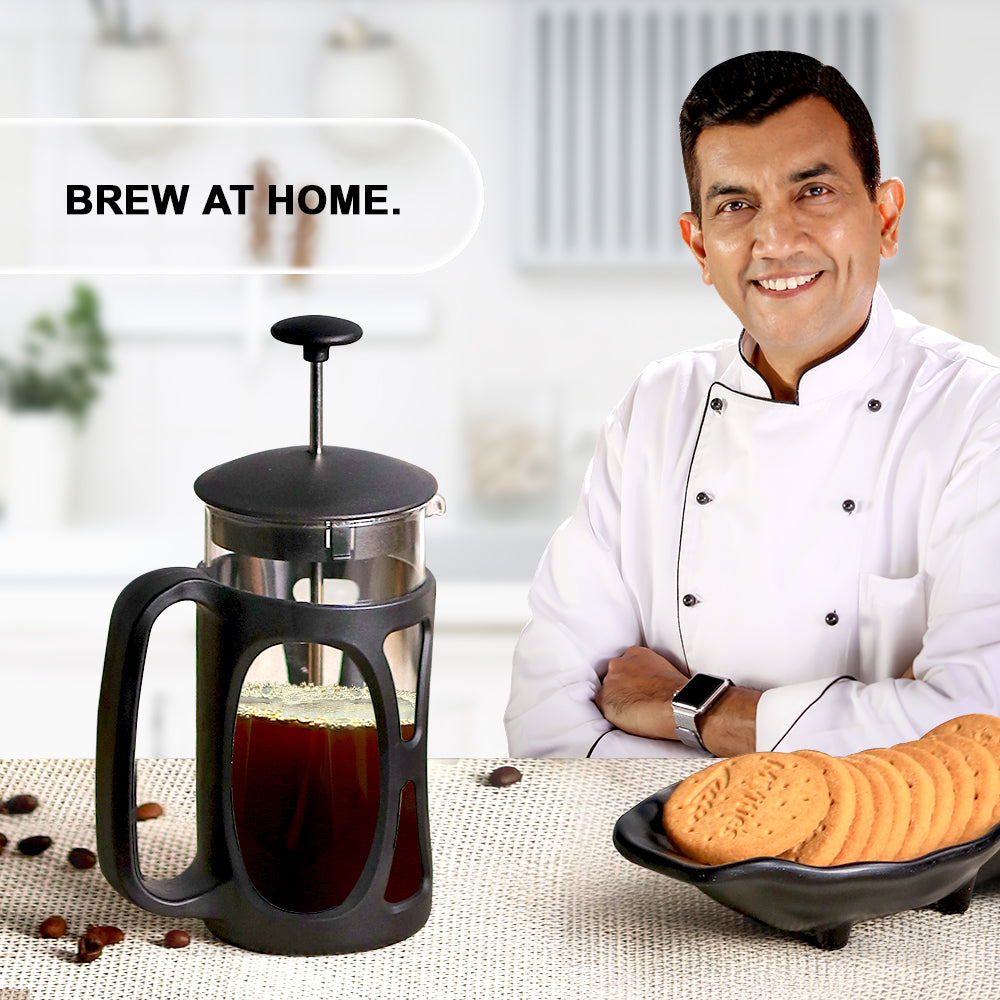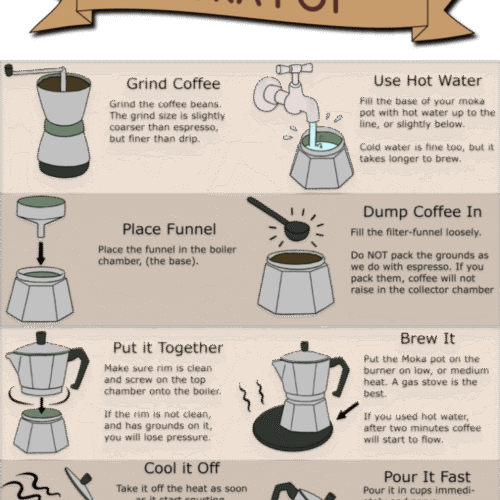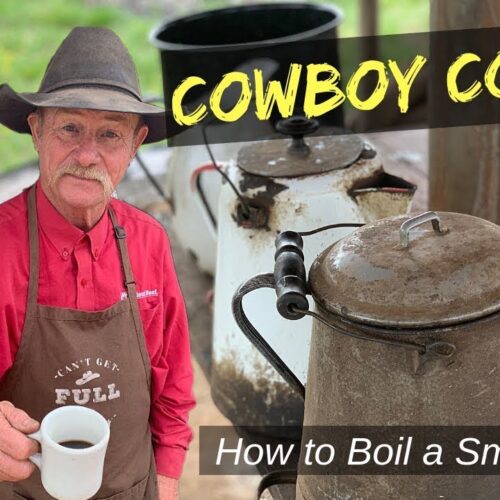To French Press coffee, add coarse grounds to the carafe, then hot water, steep, and press. Mastering the French Press requires precision and the right technique.
Coffee enthusiasts often seek the rich, full-bodied flavor that a French Press can provide. Unlike other brewing methods, this manual style allows oils and fine particles from the coffee grounds to remain in the final cup, leading to a stronger, more robust taste.
Perfect for those who appreciate the craft of making coffee, the French Press method involves just a few simple steps, yet opens up a world of deep and complex flavors. It’s all about the ratio of coffee to water, the grind size, water temperature, and steep time. Unlocking the full potential of your coffee beans with a French Press can transform your morning routine into a gourmet coffee experience right in your own kitchen.
Introduction To French Press Coffee
Unlock the full potential of your coffee beans with the timeless French Press method. This traditional approach to brewing coffee embraces simplicity and rich, full-bodied flavors. Whether you’re a coffee aficionado or a budding barista, mastering the French Press is a game changer.
Understanding The French Press Method
A French Press, often called a press pot or plunger pot, uses a simple immersion technique. Coarse-ground coffee beans steep in hot water for several minutes, followed by the pressing of a plunger to separate the grounds from the liquid.
This is what makes the magic:
- Coarse Grounds: Essential for the perfect brew.
- Hot Water: Should be just off the boil.
- Steeping Time: Usually four minutes.
- The Plunge: Separates the brew from the grounds.
Benefits Of Brewing With A French Press
Brewing coffee in a French Press offers unique advantages:
- Flavorful and Full-bodied: The coffee retains essential oils, offering a complex taste.
- Control Over Brew: Adjust the time and coffee-to-water ratio to your taste.
- No Waste: No paper filters required, which is better for the environment.
- Simplicity: French Press is user-friendly and doesn’t need electricity.

Credit: www.wonderchef.com
Essential Tools And Ingredients
Embarking on the French press journey requires the right equipment and premium ingredients. Perfecting this method transforms your coffee routine into a craft experience. Let us dive into the essentials for French press coffee.
Selecting The Right French Press
Material and size matter when choosing a French press. Popular options include glass, stainless steel, and ceramic. Each has its own virtues impacting flavor and heat retention.
- Glass: Showcases the brewing process, but may hold heat poorly.
- Stainless Steel: Excellent at retaining heat, often more durable.
- Ceramic: Stylish, good heat retention, but more fragile.
Size is also vital. A 3-cup French press caters to solo drinkers, while larger sizes like an 8-cup press serve multiple cups.
Choosing Quality Coffee Beans
The origin, roast profile, and freshness influence your coffee’s taste. Freshly roasted beans, sourced responsibly, ensure the best flavor.
| Roast Type | Flavor Profile |
|---|---|
| Light Roast | More acidity, bright flavors |
| Medium Roast | Balance of acidity and body |
| Dark Roast | Less acidity, rich and bold |
Single-origin beans provide unique tastes. Blends offer a balanced profile.
Understanding Grind Size Importance
The grind size can make or break your French press coffee. A coarse grind is ideal. It ensures full flavor extraction without passing through the press’s mesh filter.
- Too fine, and you risk a muddy cup.
- Too coarse, and the brew might be weak.
For best results, grind your beans just before brewing. Consistency in grind size ensures a smooth and even flavor profile.
Preparation Before Brewing
The secret to a sensational cup of French Press coffee lies in the preparation. Just as a painter preps a canvas, coffee enthusiasts must fine-tune their process. Below, we outline the critical steps to set the stage for unparalleled flavor and aroma from your French Press.
The Art of Coffee Grinding for French PressThe Art Of Coffee Grinding For French Press
Coarse and consistent – these words should guide your coffee grinding approach. Here’s why it matters:
- Texture: A coarse grind ensures optimal extraction, preventing a muddy cup.
- Flavor: Larger grounds allow water to circulate and “greet” each particle evenly.
Preheating Your French Press
A warm French Press is crucial for a hot coffee that stays hot. Here’s your hack:
- Pour hot water into the press.
- Swirl the water around.
- Discard the water before adding coffee grounds.
This simple act elevates your coffee by ensuring the temperature is just right.
Measuring Coffee and Water RatiosMeasuring Coffee And Water Ratios
Accuracy is key for a balanced brew. Use these ratios:
| Coffee (g) | Water (ml) |
|---|---|
| 30g | 500ml |
| 15g | 250ml |
The rule of thumb is 1g of coffee to 16-17ml of water. Adjust to taste.

Credit: www.amazon.com
The Brewing Process
The French Press offers a rich and robust cup of coffee by allowing the grounds to steep directly in hot water. Embrace the simplicity of this timeless method with our easy-to-follow guide. Perfect your brew with these steps.
Step-by-step Guide To Brewing
- Start by heating water until just before boiling.
- Grind coffee beans to a coarse consistency.
- Add coffee grounds to the French Press.
- Pour hot water over the grounds, filling the press.
- Stir to ensure even brewing and cover with the lid.
- Allow coffee to steep for the recommended time.
- Slowly press the plunger down, separating the grounds.
- Pour and enjoy!
Optimal Water Temperature For French Press
The ideal water temperature for French Press coffee is between 195°F to 205°F. Too hot, and you risk bitterness. Too cool, and the extraction is incomplete, leaving you with a flat taste. Use a thermometer to check the temperature or let boiling water sit for a minute before pouring.
The Steeping Time: Finding The Sweet Spot
For French Press, the steeping time profoundly affects flavor. A standard time to steep is 4 minutes. However, some coffee enthusiasts prefer a range of 3 to 5 minutes to find their perfect balance of strength and flavor. Experiment and taste at different intervals to discover your sweet spot.
Advanced Brewing Techniques
Exploring advanced brewing techniques with a French press takes the coffee experience to new heights. Mastering these methods ensures a more refined cup, tailored to personal tastes. Discover the art of tweaking brew times, stirring, and plunging for a perfect French press coffee.
Experimenting With Brew Times
Tailoring brew time is key for flavor. Starting at four minutes is standard, but adjusting can unlock new profiles.
Opt for a shorter brew for a lighter cup, while extending the time yields a stronger brew. Keep notes to track results.
The Stirring Debate: To Stir Or Not To Stir
Stirring, a simple yet contentious step, mixes grounds for even extraction. Consider these points in the stirring puzzle:
- To stir: Integrates grounds for consistency. Do so after pouring water.
- Not to stir: Lets grounds steep undisturbed for a delicate infusion.
Perfecting The Plunge: Technique Matters
The plunge affects clarity. Press down slowly and steadily to keep grounds at the bottom. A perfect plunge ensures a smooth, sediment-free cup.

Credit: www.amazon.com
Post-brewing Practices
The process of making French Press coffee doesn’t end with the plunge. After brewing, certain steps ensure the best taste and ease of cleanup. Let’s dive into these crucial post-brewing rituals.
Decanting: Preserving The Taste
Leaving coffee in the French Press can lead to over-extraction. It turns your brew bitter. Decanting is the answer to this problem.
- Pour the coffee into a carafe immediately after brewing.
- This stops the brewing process and preserves flavor.
- It ensures consistent taste for each cup.
The Cleanup: Quick And Efficient Methods
Cleaning your French Press is essential to maintain its lifespan and your coffee’s flavor. Here are steps for a quick and efficient cleanup:
- Eject the grounds into a compost bin or trash.
- Rinse the plunger and carafe with hot water.
- Wash with soapy water or place it in the dishwasher if safe.
- Reassemble once dry for the next use.
Serving Your French Press Coffee
The final pleasure of French Press brewing is serving. Make it exceptional:
- Warm the cups with hot water beforehand.
- Fill each cup three-quarters full to allow room for milk or cream.
- Consider serving with a French Press on the table for refills.
Troubleshooting Common Issues
A French Press can make delicious coffee. But sometimes, things go wrong. Your brew might be too strong, too weak, or have gritty grounds in it. Let’s fix these common French Press problems.
Dealing With Over-extraction
If your coffee tastes bitter or harsh, it’s likely over-extracted. This means the water was in contact with the coffee grounds too long. Try these:
- Shorten the brew time: Aim for 3-4 minutes.
- Coarser grind: Use bigger coffee pieces.
- Lower water temperature: Aim for 195-205°F (90-96°C).
Addressing Under-extraction
Weak or sour flavors mean under-extraction. The water didn’t pull out enough flavor. Make it right:
- Increase the brew time: Go up to 4 minutes.
- Finer grind: Smaller pieces extract faster.
- Hotter water: Ensure it’s near boiling but not boiling.
How To Avoid A Gritty Cup
Grit ruins a smooth cup of coffee. Stop grit:
- Correct grind: Use a consistent, coarse grind.
- Clean your press: Remove old grounds that might slip through.
- Quality filter: Invest in a press with a fine mesh filter.
Enhancing Your French Press Experience
Mastering the art of French Press coffee opens the door to a richly rewarding brewing experience. Consistency, technique, and the right ingredients define the craft. Elevate your daily ritual and embark on a flavorful journey with these curated enhancements.
Coffee Add-ins And Flavors
Transform simple brews into gourmet delights with creative add-ins. Whether seeking comfort or adventure, options abound for enhanced taste:
- Cinnamon: A dash creates a warm, spicy undertone.
- Vanilla extract: Elevates sweetness and aroma.
- Cocoa: Offers a chocolatey depth to the coffee.
- Nutmeg: Adds a distinctive, festive flavor.
- Cardamom: Brings a Middle Eastern twist.
Complementary Foods And Pairings
Enhance your French Press coffee by pairing it with foods that highlight its flavors:
| Coffee Characteristic | Food Pairing |
|---|---|
| Bold & Rich | Dark chocolate or a buttery croissant |
| Light & Fruity | Fresh berries or lemon pastries |
| Smooth & Creamy | Cheesecake or almond biscotti |
Exploring Different Coffee Roasts And Regions
Uncover the diverse range of flavors offered by various roasts and origins:
- Light Roasts: Often tangy and mild. Ideal for tasting the bean’s natural notes.
- Medium Roasts: Balanced flavor with a fuller body compared to light roasts.
- Dark Roasts: Bold, robust, with a hint of bitterness. Perfect for those who enjoy a strong cup.
Delve into different regions to discover unique profiles:
- Latin America: Known for crisp and lively flavors.
- Africa: Offers fruity and floral notes.
- Asia: Typically presents earthy and woody aromas.
Comparative Brewing Methods
Exploring different ways to brew coffee can transform your java experience. From French Press to other brewing devices, each method has its unique flavor profile and technique. Let’s dive in and compare how the French Press stacks up against other popular brewing methods.
French Press Vs. Aeropress
| French Press | AeroPress |
|---|---|
| Steeps coffee for 4 minutes | Fast brewing in 1-2 minutes |
| Rich, full-bodied flavor | Smooth, less acidic taste |
| Simple to use, no paper filters | Compact and portable |
The choice between a French Press and an AeroPress comes down to your taste preference and lifestyle needs.
French Press Vs. Drip Coffee
- French Press: offers full control over brewing time and temperature.
- Drip Coffee: convenient for making multiple cups quickly.
- Oil and flavor: French Press retains more compared to the filtered approach of drip coffee.
Do you savor a strong cup or need efficiency in the morning? Your daily routine helps decide between a French Press and drip coffee.
French Press Vs. Espresso
- French Press requires coarse ground coffee and longer brewing.
- Espresso uses fine grounds and high pressure for a quick shot.
- Intensity: Espresso is more concentrated than French Press coffee.
If you prefer a coffee ritual with a bold cup, choose a French Press. For a quick, robust espresso, an espresso machine is your match.
Maintaining Your French Press
Delight in the ritual of French press coffee with the assurance that your equipment is in prime condition. Proper maintenance not only ensures the longevity of your French press but also the quality of your coffee. Follow these simple steps for a consistently perfect brew.
Regular Cleaning For Longevity
Keeping your French press clean is crucial. Here’s a routine to follow after each use:
- Disassemble the parts.
- Rinse them in warm water.
- Cleanse with mild detergent.
- Use a soft brush for grounds.
- Rinse again to remove soap.
- Dry all parts thoroughly.
This routine preserves your French press, ensuring that old coffee oils don’t impact your brew’s taste.
When To Replace Parts
Your French press will tell you when it’s time for new parts. Look out for these signs:
| Part | Signs of Wear |
|---|---|
| Plunger Assembly | Loose or bent parts |
| Filters | Tears or permanent stains |
| Glass Carafe | Cracks or chips |
Replace worn parts promptly to maintain a flawless coffee-making experience.
Storing Your French Press Properly
A good storage routine will protect your French press from damage:
- Store in a dry place.
- Keep out of direct sunlight.
- Avoid stacking items on top.
For those with limited space, consider a shelf or cabinet solely for coffee equipment.
Frequently Asked Questions On How To French Press Coffee
How Much Coffee Do I Put In A French Press?
Use a ratio of 1 gram of coffee to 15-17 milliliters of water for the perfect French press brew.
What Are The Instructions For A French Press Coffee Maker?
1. Boil water, then cool for 30 seconds. 2. Add coarse ground coffee to the French press. 3. Pour hot water over coffee grounds, stir briefly. 4. Let the mixture steep for 4 minutes. 5. Slowly press the plunger down and serve.
How Hot Should Coffee Be For French Press?
Ideal water temperature for French press coffee is between 195°F to 205°F (90°C to 96°C).
Can You Use A French Press With Regular Coffee?
Yes, you can use a French press with regular coffee, but choose a coarse grind for optimal results.
What Is The Ideal French Press Ratio?
The ideal ratio for French Press coffee is 1 gram of coffee to 15-18 grams of water, depending on your taste preference.
Conclusion
Mastering the French press means unlocking a robust, flavorful cup of coffee. Enjoy the handsome payoff of your efforts after a precise brew. Remember, the key lies in the grind, water temp, and timing. Sip and savor knowing you’ve crafted the perfect java right in your kitchen.
Embrace this ritual and let the rich aromas guide you to a delightful coffee experience, one press at a time. Cheers to a brew that’s distinctly yours!








